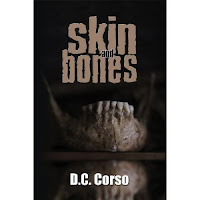I could lie and say that I had the underlying theme of isolation in mind when I chose to set Skin and Bones, my first mystery, on the fictional Carver Isle. I could bend the truth and say that it was all part of my grand scheme of placing guarded and distant characters in a community which is itself remote and distant. But at the time I didn’t really consciously think about it – who really develops a theme in advance of a story? The superficial truth is almost disappointing in its simplicity: I chose the Pacific Northwest island community because it was something I knew, and something that felt right.
Back in the late eighties and early 90s, I lived in Seattle. Being in my mid-twenties at the time, I missed California and the comfort of friends and family, and moved back to the Bay Area. I returned often to visit my sister Ginny and her husband Stu on Bainbridge Island, discovering that while on the surface island living appears very quaint, there are in reality vast socioeconomic gaps. As the price of Seattle homes jumped in the ’90s, longtime islanders found themselves with skyrocketing property values – and taxes – as more and more city folk sought to relocate to Bainbridge. Naturally, resentment grew between those who held ranches and farmland on the island and those who eagerly sought to develop and sell said land. While I didn’t want economic disparity and class resentment to be at the forefront of Skin and Bones, I can’t deny that it’s a hugely important part of the scenery.
But why not just set the tale in a suburb? Honestly, because island communities are much more closely knit than you might find in a suburb. Suburbs allow for a comfortable distance from your neighbors, and this simply does not exist within island communities. While everyone does not necessarily know everyone else on an island, they do know everyone on their block, sometimes far more than they want to know them. In most suburbs, people tend to know just what they need to get by. They know roughly who their neighbors are, but not much beyond their names and house numbers.
Had I set the tale someplace like West Seattle or even the remote and woodsy Snoqualmie, the story might have worked, but those locations still felt far too accessible. Water lends distance to that which may otherwise be near, so the island community completed the setting puzzle nicely.
Looking back, I think the writer in me subconsciously understood that a dark and isolated township surrounded by water would perfectly reflect the story's underlying darkness and the characters' own issues and problems. Then again, hindsight is 20/20.
Thank you for your insights!
Bill



